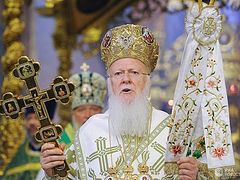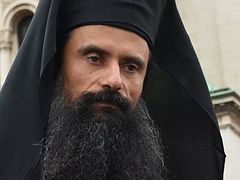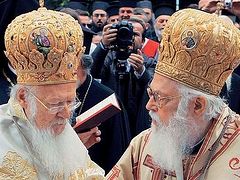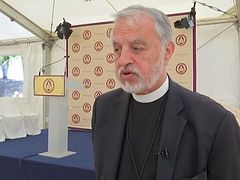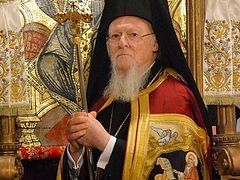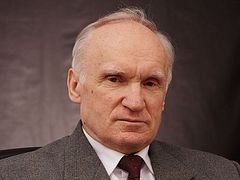Istanbul, October 25, 2019
Christianity is a religion of love and dialogue, and the Church’s unique contribution to our modern world is precisely its openness to meeting and having dialogue, Patriarch Bartholomew said in a recent interview with the Romanian outlet evz.ro.
“If there is a unique and contributing element of the Orthodox Church for our time and our world, this would be the meeting and the dialogue. This is the spirit we want to convey to you,” the Patriarch said.
“It is our belief and, at the same time, our hope that Christianity can be viewed as a religion of love and dialogue. The visions of the Gospel are what the Orthodox Church seeks to incarnate and support in the modern world” he continued.
Dialogue is vital especially in a country like Turkey, where Islam is the dominant faith, the Patriarch said. “When we meet openly and honestly, brother and sister in a conversation, and communication begins with our mutual respect for humanity and our common belief in God, then we are able to break down barriers between religions and nations.”
And speaking of his election as Ecumenical Patriarch in 1991, Pat. Bartholomew said he understood and understands his task to be one of creating and safeguarding unity between Orthodox Churches and working towards inter-Christian reconciliation.
“What we must constantly remember in the Church is that such an inheritance is not a luxury or privilege, but a burden and responsibility, which have little visible or external reward, but only conscious conviction to care we answer, respecting and preserving a tradition and practice of twenty centuries,” the Patriarch said.
The Synods, primates, and hierarchs of the Local Orthodox Churches around the world are eagerly awaiting when Pat. Bartholomew will initiate a dialogue on the Ukrainian crisis. Calls for a pan-Orthodox council have come from around the world, though they have so far been rejected. Metropolitan Nektarios of Corfu of the Greek Church recently commented that everyone wants dialogue except Pat. Bartholomew.
Moreover, the Church has the same interests as society, the prelate of Constantinople said. Many have the mistaken idea that religion has its own interests and concerns and society its own, but this is mistaken, useless, and dangerous, Pat. Bartholomew believes. “Everyone must work together to improve the conditions in our world,” which therefore includes religions working together with society.
And commenting on his presence at Pope Francis’ installation in 2013, Pat. Bartholomew said: “It is true that our spontaneous decision to attend the inaugural Mass of Pope Francis was unprecedented. Once again, however, in view of this openness and a spirit of cooperation, we consider our personal friendship with Pope Francis as a primordial way to influence our believers and shape our world towards peace and not war, tolerance and not prejudice and inclusion and not isolation. This is certainly the message of the Gospel in today's world.”
In this vein of connecting with the modern world, the Council of Crete in 2016 necessary, Pat. Bartholomew comments, as several Churches have long resisted engaging with the modern world, he believes. Thus, “it was not surprising to us that it shook many of our Churches.”
Regarding the granting of autocephaly to the so-called “Orthodox Church of Ukraine,” Pat. Bartholomew notes that we no longer live in Byzantium or the soviet era, and the Church should promote freedom.
“We believe that it is part of the mission and ministry of the Ecumenical Patriarchate, to encourage and to enable the Local Church to be able to reach the same level of self-determination and self-government, enjoyed by so many of the other Churches who had received the same gift from the Mother-Church of Constantinople, including Russia, Romania, and Greece,” Pat. Bartholomew commented.
Recall that the tomos of autocephaly granted to the OCU actually granted it considerably less freedom than some other Local Churches and considerably less than the canonical and autonomous Ukrainian Orthodox Church of the Moscow Patriarchate.
Additionally, many hierarchs, such as His Beatitude Metropolitan Onuphry of Kiev and All Ukraine, the primate of the canonical Ukrainian Church, and His Eminence Metropolitan Amfilohije of Montenegro of the Serbian Church, have especially noted the fact that the Byzantine Empire no longer exists.


